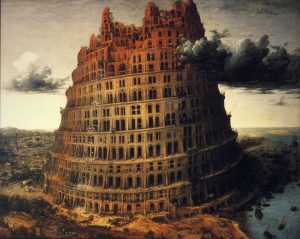Establishing understanding from the confusion
The exercise of language is certainly not the sole domain of man although admittedly humanity has developed and expanded the realm of language to far greater methods of expression and form than any other living creature. Whether our overly expansive repertoire is in the least beneficial is an altogether different kettle of fish.

Tower of Babel
In the beginning man spoke and expressed himself using a common rudimentary language that lacked any subtlety, nuance, ambiguity, or guile. In his arrogance and conceit man attempted to break the bonds of earth and build a tower to the very gates of heaven for “they said, ‘Come, let us build ourselves a city and a tower with its top in the sky, and so make a name for ourselves.”[1] When God saw what man envisioned he said: “If now, while they are all one people, all speaking the same language, they have started to do this, nothing will later stop them from doing whatever they presume to do. Let us then go down and there confuse their language, so that one will not understand what another says.”[2]
God created us and made us in His image and likeness but not in His Divinity. We are not God even though many have thought of themselves as such and a few have singularly elevated themselves to undeserved, self-proclaimed godhood. Even among those who share no deifying pretention or pretext, we often find ill-conceived notions of divine power and godlike visions of grandeur. Those who find no fault or failure within their own selves while holding fast to the vanity of their own omnipotence and self-righteousness also carry the burden of deification as those so publicly proclaimed.
As with all things there are clearly varying degrees of deification. It is for each of us to recognize within ourselves the human tendency to lord it over one another, to see our self as better or best, greater or greatest, smarter or smartest. Any self-aggrandizement which utilizes superlatives necessarily denigrates those who are not you while placing yourself on a self-constructed pedestal of self-importance.
At the time when the Old Testament was first written the Hebrew language consisted of about 5,000 words compared with the modern English language which is estimated to contain approximately 1,025, 109 words. Linguists estimate that there are between 6800 to 6900 distinct languages in the modern world although most of them are spoken by fewer than 1,000 people. Adding to the plethora of languages is the fact that one common language can be so dialectally disparate as to be literally incomprehensible to someone speaking the same language. For example, the Spanish of Mexico differs drastically from Castilian Spanish.
If language was merely a collection of words it would be a relatively simple process to translate from one to another which would quite effectively override God’s prescribed confusion. But we can and do communicate with one another without and beyond words. Our appearance, inflection, and tone of voice add unspoken meaning to the spoken word. Cultural and societal biases alter and distort, resulting in disconnects between words and meaning. Deliberate ambiguity, obfuscation, and prevarication all work to reshape and distort the linguistic message.
Obviously God was not kidding around when He decided to add confusion to the linguistic mix.
[1] Gn 11:4.
[2] Gn 11:6-7.
